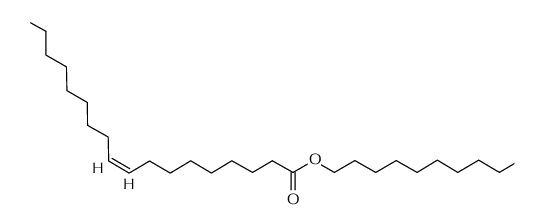What Is Decyl Oleate?
Decyl oleate is an ingredient used to formulate a variety of cosmetics and skincare products. It is mainly used as an emollient and skin-conditioning agent. Decyl Oleate is considered to be comedogenic and should be avoided by those with acne prone skin.
Decyl oleate is an ester of decyl alcohol and oleic acid. Decyl alcohol, also known as 1-decanol, is a straight chain fatty alcohol with ten carbon atoms. Fatty alcohols, despite having alcohol in their name, are actually very moisturizing to the skin.
Oleic acid is a monounsaturated omega-9 fatty acid that occurs naturally in various animal and vegetable fats and oils, for instance, olive oil. These two substances can be reacted together to form decyl oleate. Decyl oleate is a clear, yellow liquid that is soluble in most hydrophobic solvents such as silicones, esters, mineral oils, vegetable oils and mineral spirits.

Decyl Oleate
the good: Decyl oleate is used to improve the texture of products, it also helps to improve the moisturizing properties of a formulation.
the not so good: It can be comedogenic, which means that it may clog your pores. For this reason some acne-prone and congested skin types may want to avoid its use.
Who is it for? All skin types except those that have an identified allergy to it.
Synergetic ingredients: Works well with most ingredients
Keep an eye on: Nothing to keep an eye on here.
What Are The Benefits Of Decyl Oleate?
In cosmetics and skincare products, decyl oleate functions as an emollient and skin-conditioning agent. Decyl oleate can be found in products such as facial moisturizers, body moisturizers, anti-aging treatments, sunscreens, makeup, makeup removers, hair conditioners, and aftershave products.
Emollient
As an emollient, decyl oleate works to soften and soothe the skin by acting as a lubricant. Decyl oleate can be classified as an occlusive emollient because it forms a thin film on the skin that is neither greasy nor tacky.
The film also helps to prevent evaporation of the skin’s natural moisture. Over time, this increases skin hydration by causing buildup of water in the uppermost layers of skin.
While all skin types can benefit from emollients like decyl oleate, emollients are especially helpful for those who have dry, rough, and flaky skin. Emollients can alleviate these symptoms, leaving the skin looking and feeling soft and smooth. In addition, emollients can benefit those that suffer from conditions such as eczema, psoriasis, or other inflammatory skin conditions.
Conditioning
Decyl oleate can also be found in hair conditioners and other hair care products because of its emollient properties. Similar to how emollients work on the skin, an emollient for hair should easily form a smooth, even film on the surface of the hair. This film helps to seal in moisture and soften the hair. Emollients act as lubricants and provide increased slip between adjacent hair strands, which makes detangling much easier. Hair emollients also smooth and flatten the cuticle surface, which adds shine and gloss to the hair.
Is Decyl Oleate Good For Acne-Prone Skin?
One drawback of decyl oleate is that it is highly comedogenic. Comedogenic means that an ingredient tends to cause blackheads by blocking the pores of the skin. Even if a single ingredient, such as decyl oleate, in a skin care or cosmetic product is comedogenic, the product as a whole is considered to be comedogenic.
Decyl oleate is very likely to cause breakouts for those with acne prone skin. If your skin does not break out easily, it is still recommended to use caution with facial products containing this ingredient.
Is Decyl Oleate Vegan?
Decyl oleate is considered to be a vegan ingredient. This is because it is derived from vegetable or synthetic based ingredients, avoiding the use of animal or animal byproduct based ingredients.
If you are looking for a vegan formulation, always check the other ingredients in the ingredient list and ensure that the brand is cruelty-free.
Is Decyl Oleate Safe?
The safety of decyl oleate has been assessed by the Cosmetic Ingredient Review Expert Panel. The Cosmetic Ingredient Review Expert Panel is a group that is responsible for the independent evaluation of the safety and efficacy of skincare and cosmetic ingredients.
Clinical studies indicate that decyl oleate possesses low acute oral toxicity. Single application dermal and eye studies have shown that a 100% concentration of decyl oleate produces little or no irritation. Decyl oleate was also not found to be a skin sensitizer.
After evaluating all scientific data, the CIR Expert Panel concluded that decyl oleate was safe at the reported use concentrations in cosmetics and skincare products.







